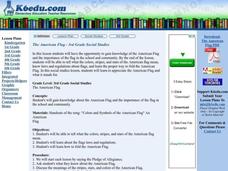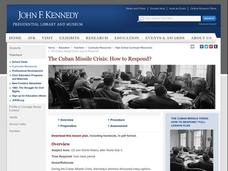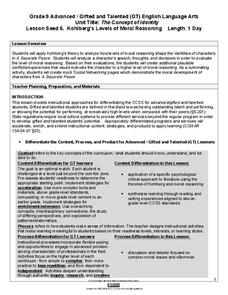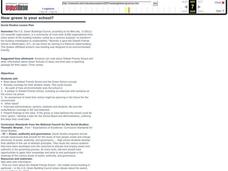iCivics
Step Five: All about Public Policy
Public policy is important to understand because it affects everyone. The resource tells middle schoolers how the government uses policy to accomplish goals in the administration. It includes a reading, true or false worksheet, a...
Smithsonian Institution
Mobilizing Children
Scholars find out how the government used propaganda to mobilize children to help in the war effort. Lesson exercises include analyzing a quote from Franklin Roosevelt, viewing propaganda images and posters, and participating in a lively...
Curated OER
The American Flag
Third graders gain knowledge of the American Flag and the importance of the flag in the school and community. In this social studies lesson, 3rd graders discover what the colors, stripes, and stars of the American flag mean, review laws...
Channel Islands Film
Cache: Lesson Plan 3 - Grades 4-5
Should the excavation of what is believed to be the cave of the Lone Woman of San Nicholas Island be allowed to continue? As a practice exercise designed to prepare pupils for a timed writing exam, individuals read two Los Angeles Times...
Friends of Fort McHenry
Privateers in the War of 1812: Soldiers or Thieves?
Do governments have the right to authorize individuals to perform illegal acts during times of war? Did the US government really employ pirates? Use the War of 1812 as your vessel to answering these questions through class discussion and...
Orange County Water Atlas
Location, Location, Location…
Young geographers discover not only how to read and recognize coordinates on a map, but also gain a deeper understanding of latitude and longitude and how climate changes can vary significantly across latitudes.
University of Chicago
Comparing Modern and Ancient Ideas of Ethnicity and Identity
Explore ethnicity and identity with a research and writing assignment. Class members conduct online research, looking in particular at images and carefully noting down their sources on notecards. They read about identity and compose...
Crafting Freedom
Man in the Middle: Thomas Day and the Free Black Experience
How did free and enslaved blacks work to craft freedom for themselves and their families before the Civil War? Young historians read about the life of Thomas Day, a free black man who also owned slaves and had abolitionist ties in...
John F. Kennedy Presidential Library & Museum
The Cuban Missile Crisis: How to Respond?
For 13 days, the United States stood on the edge of nuclear War. The Soviet Arms buildup in Cuba is the focus of an activity that asks groups to analyze how the governmental role each of John F. Kennedy's advisors played went on to...
Channel Islands Film
Cache: Lesson Plan 2 - Grades 4-6
Class members will dig this activity that has them trying their hand at recovering artifacts. Groups are assigned a section of a sandbox, carefully uncover the artifacts in their section, and then develop theories about who might have...
Channel Islands Film
Lone Woman of San Nicolas Island: Lesson Plan 4
Imagine being stranded all alone on an island for 18 years. How would you survive? Class members are challenged to makes necessities out of natural materials that would likely be found on an island.
US Institute of Peace
Responding to Conflict: Nonverbal Communication
What does your posture say about you? How can it affect the outcome of conflict resolution or negotiation? Show scholars the importance of nonverbal communication during the sixth in a series of 15 peacebuilding lessons. Learners work...
Maryland Department of Education
The Concept of Identity Lesson 6: Kohlberg's Levels of Moral Reasoning
How does our moral reasoning shape our identity? After a study of Kohlberg's Levels of Moral Reasoning, readers use Kohlberg's theories to analyze the speech, thoughts, and decisions of a character in A Separate Peace. They then create...
Global Oneness Project
Deconstructing Consumerism
A short, engaging video provides a critique of the hyper-consumerist mentality that many think have taken over the Western world. After watching the video, pupils reflect on their own habits and use evidence to respond to discussion and...
University of the Desert
Why Is Cultural Diversity a Positive Thing?
From more empathetic individuals to greater tolerance in government, learners explore the benefits of a culturally diverse world through a series of collaborative, discussion-based activities.
Curated OER
How green is your school?
High schoolers read about Sidwell Friends School and the Green School concept. They develop coverage for their student media. Students interview administrators, janitors, teachers and high schoolers. They present findings to the class.
Curated OER
Campaign Signs and Pranksters
Students collect campaign literature and investigate what signs local candidates are using. Students contact local politicians/candidates and interview them about the concepts and creation of their campaign literature. Students compare...
Curated OER
The Power of the Image: Understanding Symbols in Buddhist Art
Students discuss symbolism in art, examine various images of compassion in Buddhist tradition, analyzing components of the concept, and then produce their own images of compassion through art.
Curated OER
Looting and its Punishment
Students research the concepts of looting and possible punishments. The outcomes of students research is important for this lesson plan. They write an article that publishes the results of new knowledge.
Curated OER
Pizza and the Economy
Students become aware of the history behind pizza and how it was adapted to the economic and geographic conditions of the United States. They have a basic understanding of the concepts of supply and demand.
Curated OER
Philanthropic Literature: Quilt to Freedom
A reading of Sweet Clara and the Freedom Quilt by Deborah Hopkinson launches this study of slavery, freedom, and the Underground Railroad. After a discussion of the importance of showing respect for others and of helping each other in...
Curated OER
Arrest- A Legal System Simulation
What would your class do if a police officer arrested a student in class? This is exactly the anticipatory set that gets pupils engaged in a unit on the legal system. The plan is to get the officer to simulate an arrest, and then guest...
University of Chicago
Addressing Stereotypes
How is a stereotype defined, and what are some mechanisms we can use to combat negative stereotyping? Your young historians will discuss how and why stereotyping occurs, as well as consider the roots of modern conceptions of the Middle...
Curated OER
The Debate in the United States over the League of Nations: League of Nations Basics
High schoolers describe Woodrow Wilson's concepts for peace and the League of Nations and efforts to foster American support for it.

























